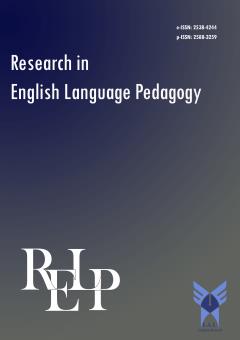Palestinian EFL Students' Vocabulary Learning Strategies
Subject Areas : Research in English Language Pedagogy
Mohammed Farrah
1
*
![]() ,
Ghadeer Darabee
2
,
Ghadeer Darabee
2
1 - English Department, Faculty of Arts, Hebron University
2 - English Department, Faculty of Arts, Hebron University
Keywords: Vocabulary learning strategies, Language proficiency, Palestinian EFL students,
Abstract :
This study investigated the vocabulary learning strategies employed by Palestinian EFL students at Hebron University, focusing on cognitive, metacognitive, and social strategies. The researchers employed the quantitate approach to achieve the aims of the study. A total of 100 participants were surveyed through a 23-item questionnaire to explore their usage of the various strategies. The results showed that Palestinian EFL students employ a range of strategies, with observable variations in their frequency and efficacy. Cognitive strategies appeared to be highly favored as participants indicated using English words in different contexts and watching English media. Metacognitive strategies like paying attention during English speech and reflection on their language progress appeared to be among the most frequently employed strategies by Palestinian EFL students. Finally, the findings revealed that participants employed social strategies though they favored learning about the culture of English speakers over asking questions or seeking feedback from native speakers. The researchers concluded that participants have high employment for cognitive and metacognitive strategies and moderate to high use of social strategies. The participants’ emphasis on cultural understanding underscores their recognition of the broader context of language use in the process of vocabulary acquisition. Finally, the researchers recommended integrating cultural content into the curriculum and providing more opportunities for participants to interact with native speakers to promote vocabulary acquisition.
Al Zahrani, M., & Chaudhary, A. (2022). Vocabulary learning strategies in ESP Context: Knowledge and Implication. Doi: 10.24093/awej/vol13no1.25
Ali, S., & Kalajahi, R. (2012). Vocabulary learning strategies and vocabulary size of ELT students at EMU in Northern Cyprus. English Language Teaching, 5(4), 138–149. DOI:10.5539/elt.v5n4p138
Anderson, J. R. (1983). The architecture of cognition. Harvard University Press.
Asgari, A., & Mustapha, G. (2011). The type of vocabulary learning strategies used by ESL students at University Putra Malaysia. English Language Teaching, 4(2), 84–90. DOI: 10.5539/elt.v4n2p84
Baskin, S., İşcan, A., Karagöz, B., & Birol, G. (2017). The use of vocabulary learning strategies in teaching Turkish as a second language. Journal of Education and Practice, 8(9)126-134. https://files.eric.ed.gov/fulltext/EJ1138831.pdf
Bastanfar, A., & Hashemi, T. (2010). Vocabulary learning strategies and ELT materials; A study of the extent to which VLS research informs local coursebooks in Iran. International Education Studies, 3(3), 158. DOI: 10.5539/ies.v3n3p158.
Bruen, J. (2001). Strategies for success: Profiling the effective learner of German. Foreign Language Annals, 34(3), 216–225. DOI: 10.1111/j.1944-9720.2001.tb02403.x
Farrah, M. (2015). The role of demographic and personal variables on the Palestinian students’ perceptions of blended learning English class. An - Najah Univ. J. Res. (Humanities), 28(4), 993 – 1026. Doi: 10.35552/0247-028-004-010
Flavell, J. H. (1979). Metacognition and cognitive monitoring: A new area of cognitive–developmental inquiry. American Psychologist, 34(10), 906–911. Doi: 10.1037/0003-066X.34.10.906
Gu, Y., & Johnson, R. K. (1996). Vocabulary learning strategies and language learning outcomes. Language Learning, 46, 643–697. Doi: 10.1111/j.1467-1770.1996.tb01355.x
Ivanovska, B., & Xhaferri, G. (2023). Second Language Vocabulary Acquisition and Learning Strategies. Folia Linguistica et Litteraria, 357–363. Doi: 10.31902/fll.44.2023.21
Khalil, A. (2005). Assessment of language learning strategies used by Palestinian EFL learners. Foreign Language Annals, 38(1), 108–117. Doi:10.1111/j.1944-9720.2005.tb02458.x
Laufer, B. (1992). How much lexis is necessary for reading comprehension?. In: Arnaud, P.J.L., Béjoint, H. (eds) Vocabulary and Applied Linguistics. Palgrave Macmillan, London. https://doi.org/10.1007/978-1-349-12396-4_12
Noor, N. M., & Amir, Z. (2009). Exploring the vocabulary learning strategies of EFL learners. Proc. 2009 7th International Conference of SoLLsINTEC, pp. 313–327.
Rabadi, R. (2016). Vocabulary learning strategies employed by undergraduate EFL Jordanian students. English Language and Literature Studies, 6(1), 47-58. doi:10.5539/ells.v6n1p47
Rahimy, R., & Shams, K. (2012). An investigation of the effectiveness of vocabulary learning strategies on Iranian EFL learners' vocabulary test scores. International Education Studies Journal, 5(5), 141–152. Doi:10.5539/ies.v5n5p141
Sanaoui, R. (1995). Adult learners' approaches to learning vocabulary in second languages. Modern Language Journal, 79(1), 15 28. https://doi.org/10.1111/j.1540-4781.1995.tb05410.x
Schmitt, N. (1997). Vocabulary learning strategies. In Schmitt, N., and McCarthy, M. Vocabulary: Description, acquisition, and pedagogy (pp. 199-227). Cambridge: Cambridge University Press.
Wahyudin, A., Pustika, R. and Simamora, M. (2021). Vocabulary learning strategies of EFL students at tertiary level. The Journal of English Literacy Education: The Teaching and Learning of English as a Foreign Language, 8(2), 101–112.
Zimmerman, C. B. (1997). Second language vocabulary acquisition. Cambridge: Cambridge University Press.

